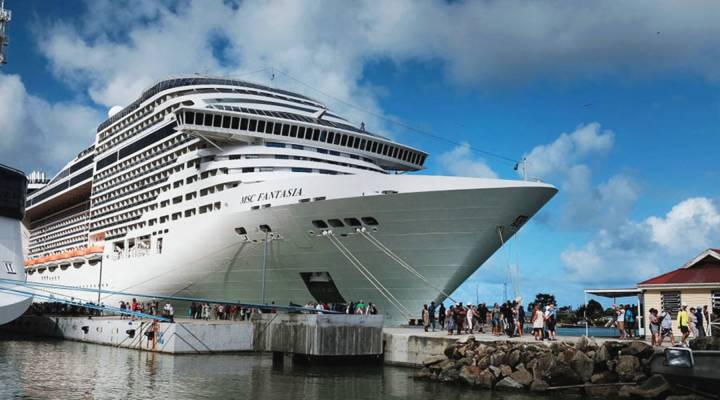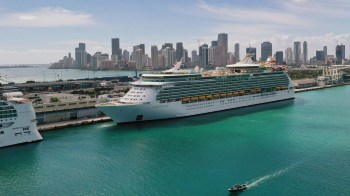
Caribbean cruise industry navigates post-hurricane season

The departure terminal at Port Canaveral on Florida’s east coast is teeming with cruisers eager to board the Norwegian Epic. The 4,100-passenger ship promises a seven-day cruise featuring a Cirque de Soleil-esque performance, a cover band performing The Beatles’ greatest hits and stops to the Bahamas, St. Thomas and Tortola.
Well, scratch St. Thomas and Tortola.
“Honestly, I was a little disappointed and disgruntled about the change,” said Nicole Stokes, who traveled from Philadelphia for a long-planned family reunion. She, along with thousands of other passengers, received an alert from Norwegian when Hurricane Maria hit that there could be a destination change. A few weeks later, she got an update that the ship would not be traveling to St. Thomas and Tortola, whose ports had closed due to storm damage. Instead, the ship would sail to Jamaica and the Cayman Islands.
“God willing, this’ll pan out better. I’m here, make the best of it,” Stokes said.
This past fall, hurricanes Irma and Maria threatened travel for thousands of tourists who’d planned to flock to the Caribbean for sunshine and beaches. Major ports to popular destinations closed, and cruise lines altered a hundred itineraries.
The changes lead consumers to question whether venturing to new places would yield the same experience and bang for their buck. The travel website Cruise Critic saw a spike in traffic and posts in forums, with questions about whether travel to the region was safe and whether the overall quality of the trip would be different.
“Itinerary changes are not uncommon,” said Colleen McDaniel, senior executive editor of Cruise Critic.
She added itinerary changes are a key reason why travelers can generally get good deals during hurricane season, such as reduced prices for third and fourth guests and free amenities on the ship. With the 2017 hurricane season’s unprecedented port closures on eight islands, including the three most popular destinations — St. Thomas, St. Maarten and San Juan — changes spiked.
To keep travelers happy, cruise lines rerouted from the eastern Caribbean to the western side.
“Some of the smaller, really beautiful Caribbean islands got visits, and these are the places that normally wouldn’t get visits, to that extent,” McDaniel said.
The Florida-Caribbean Cruise Association also launched a campaign called The Caribbean Is Open to remind travelers much of the region was still fully operational, which retained passengers.
The promise of newer destinations also has led to few cancellations according to Beth Christie, a senior cruise consultant at Cruise Vacation Outlet.
“The cruise lines are advising the people, ‘You’re going to have a schedule change.’ They’re sending us the advisories, and then we’re also communicating that to the passengers.”
Travel agents at Cruise Vacation Outlet in Orlando, Florida, have been notifying cruise passengers of itinerary changes.
The latest data from the Florida-Caribbean Cruise Association show cruise ships raked in $2.4 billion in 2015. Christie said the industry’s flexibility after the hurricanes kept their sales strong. For the islands hit, though, recovery has been slow.
“They want the cruise ships to come back because they need the revenue to work on their homes. Their economy is tourism based.”
Most of the ports that closed are now back open. And many cruise lines plan to resume their standard itineraries to those islands later this year.
There’s a lot happening in the world. Through it all, Marketplace is here for you.
You rely on Marketplace to break down the world’s events and tell you how it affects you in a fact-based, approachable way. We rely on your financial support to keep making that possible.
Your donation today powers the independent journalism that you rely on. For just $5/month, you can help sustain Marketplace so we can keep reporting on the things that matter to you.

















